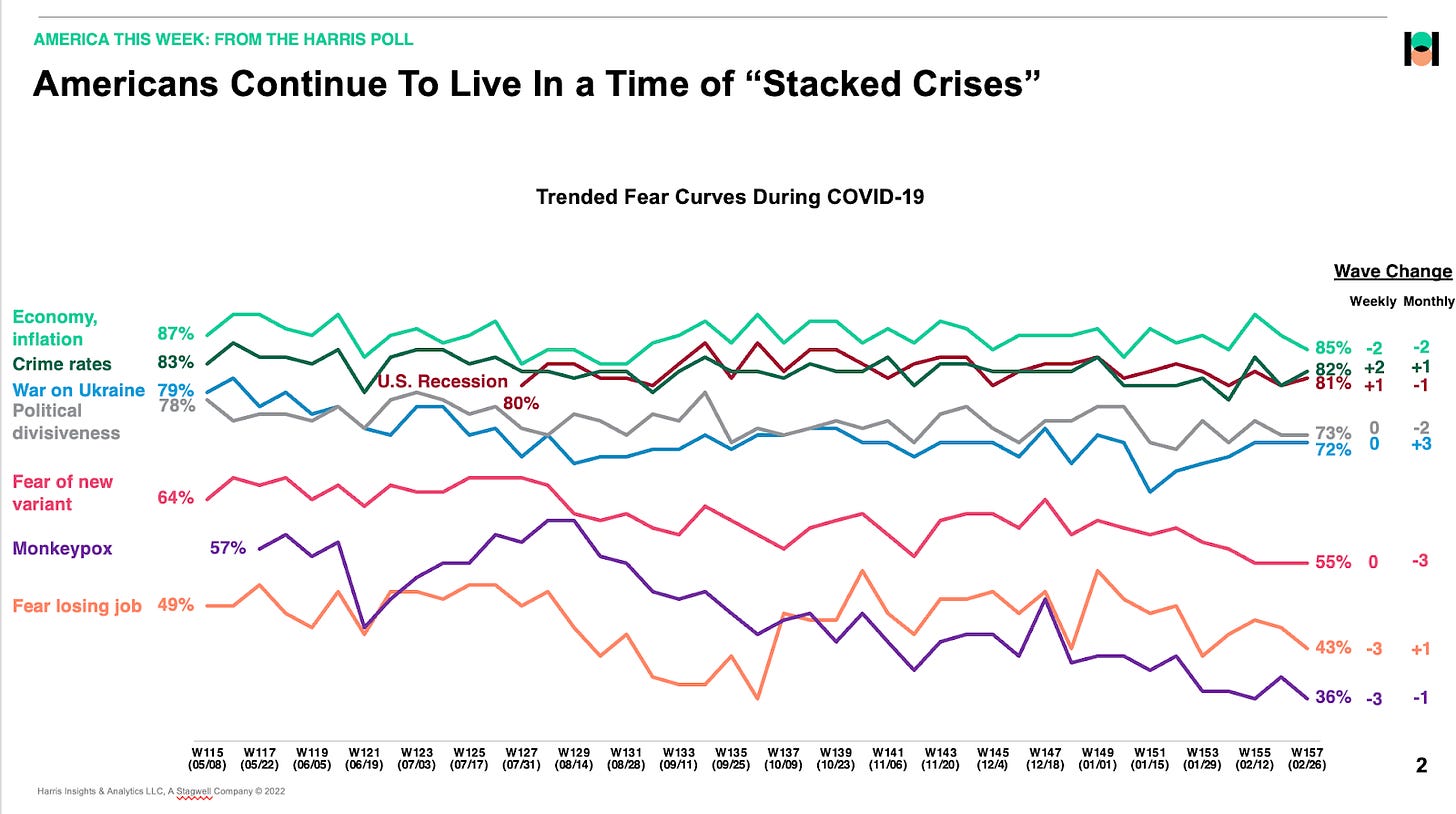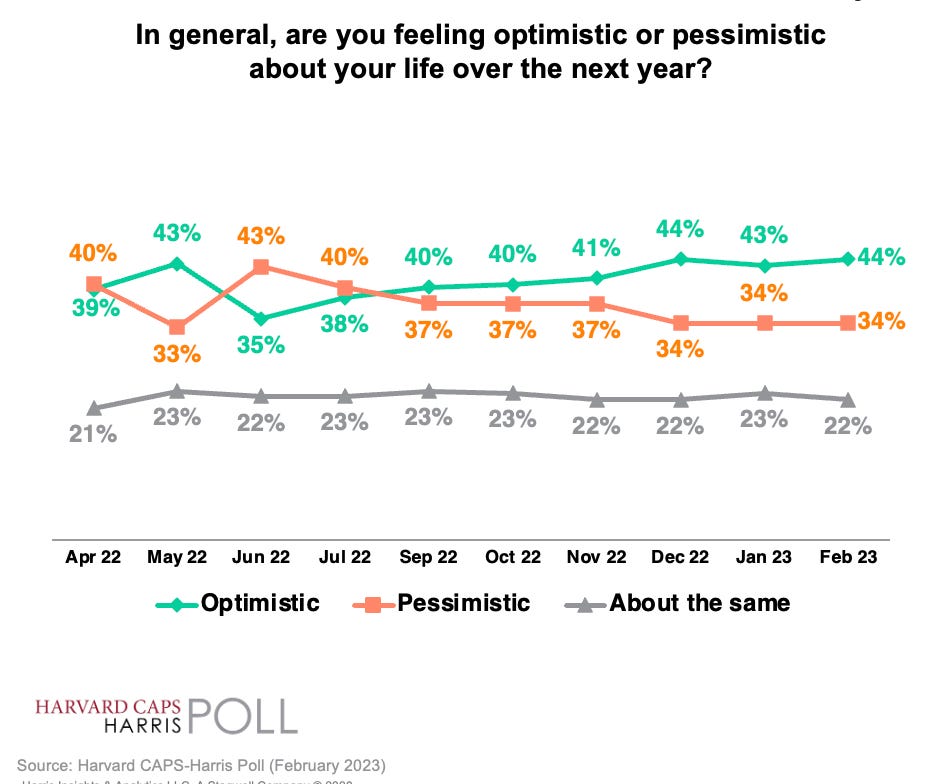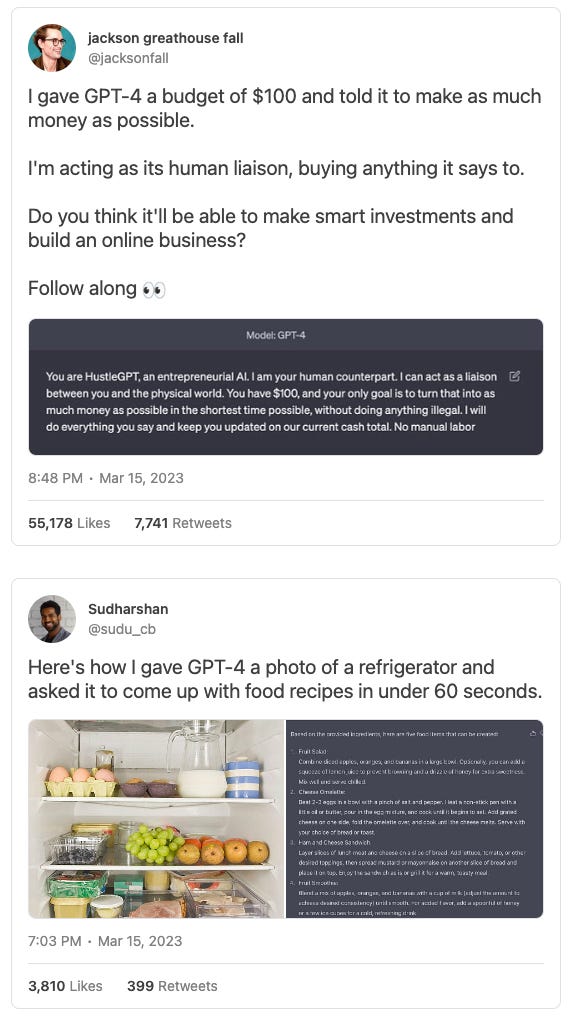Exploding Inflection Points: A Rally Cry For Spring + GPT-4 Watch Outs!
What it means to be at an inflection point in history and what to watch for as GPT-4 accelerates into the market
The Next Big Think! will send you one number, two insights, and three links weekly to keep you ahead of societal shifts.

1 Number
#WatchYourCulture
52% of employees are worried about worsening company culture, more than being laid off (42%)
Source: Justworks+ Harris Poll, featured in Forbes
Why pay attention? Anne Helen Peterson writes brilliantly about the Layoff Brain, making the argument that while layoffs provide a short-term solution, they create long-lasting trust and productivity deficits for those who survive it.
2 Insights
#1. The Fourth Turning: A Rally Call For Spring. What Role Will You Play?
What:
A concept I can’t stop thinking about lately is The Fourth Turning. A book written by the grandfathers of generational research, William Strauss and Neil Howe, identifies the cycles of history and the roles different generations play within these cycles. Strauss and Howe discovered that, similar to nature, history cycles in four seasons; spring, summer, autumn, and winter in 20-25 year cycles. Spring is renewal and rebirth, whereas winter is a crisis; it’s dark and bleak but necessary to see spring again.
This book, written in 1997, sat on my shelf for years during my agency days and predicted many of the stacked crises we see today. Van Neiset made a fantastic #BookTok about it, Wiki highlights it well, and if you are nerdy like me, you would enjoy a recent podcast with Howe talking about it here.
We are clearly in winter; according to Howe, we’ve been in winter since the 2008 global financial crisis. This crisis phase is a time when our previous desire for individuality and lack of cohesion has left us fragile and weak, surfacing systemic injustices and leaving us vulnerable to crises staggering our way (e.g., pandemics, wars, climate change, geopolitics, dictators, etc.).
What’s interesting to us is how different generations play different roles in the scheme of winter, according to Howe.
Prophet (Boomers): Came to age in an era where they were pushing boundaries and defining new freedoms. In winter, they will be ‘gray champions,’ society's wise elders providing big visions and ideals about where the world can go. Think → Bill Gates, Barack Obama, Oprah Winfrey, Sonia Sotomayor, etc.
Nomad: (Gen X) Came to age in an era where they were passionately attacking the established institutional order. In winter, they will be the commanders, effective at ensuring we get things done. Think → Satya Nadella, Mackenzie Scott, Jack Dorsey, John Oliver, Andrew Yang, Sara Blakely, etc.
Hero: (Millennials) As increasingly protected children, they come of age as team-oriented young optimists. In winter, they will bring people back together for consensus building, reestablishing communities, and rewiring the system. Think → Sam Altman, Trevor Noah, Evan Spiegel, AOC, Serena Williams, Brian Chesky, ect.
Artist: (Gen Z) Artist or adaptive generations enter childhood, a time when great dangers cut down social and political complexity in favor of public consensus, aggressive institutions, and an ethic of personal sacrifice. In winter, they will create an opening for new ideas, pushing the boundaries of the consensus. Think→ Naomi Osaka, Billie Eilish, Greta Thunberg, Lil Nas X, etc.
What the data tells us:
You probably don’t need to see the data to know it’s winter; you probably feel it. Yesterday I was an intimate conversation with executive leaders where the main question discussed was how we should navigate these bleak times.
We are at a crisis point:
Source: America This Week Tracker, Harris Poll, Feb’23
Bleak outlooks:
78% of global consumers fear that if we don't take action now to preserve our planet, some parts may become unlivable
60% of global consumers think the worst is far from over or yet to come, with numbers rising in European (73%) and NAM (65%) countries
72% of Americans say the worst of inflation is still ahead of us
78% of Americans say we are in a recession or we will be in one in the next year
Americans say their trust has decreased in the political structures, financial systems, and educations systems in the last year
Source: Further With Ford, Harris Poll Dec’22, America This Week Tracker, Harris Poll, Feb ‘23
However, optimism is rising:
Source: Harvard Caps Harris Poll, Feb ‘23
What to think about:
While we don’t have time for a book report, the vital thing to take-away is winter is a time when we rediscover the power of banding together, community life, and build consensus around a new world order.
Howe states the upside of winter is that “at the end of it, we actually solve all the problems we have, in a way that today no one thinks is possible to solve."
It’s in the darkness we rally together to immediately and quickly solve things we didn’t think were possible (e.g., FDR’s New Deal), it’s unpredictable when that will happen, but we must prepare ourselves for the reality that it will happen.
Knowing we will emerge is half the battle; the other half is better preparing people to play their roles. How can you help people find more agency as we live and emerge through winter into spring? How can you help seed ideas and think bigger about our future as build toward spring?
We will discuss this concept over the next few months as we do more in-depth research on the topic. Throw us a note or comment if there is anything you are particularly interested in understanding.
#2. GPT-4: New Highs, Need New Guardrails
What:
Related to the first point, we are in times of immense change, which have only been highlighted by the rise in generative AI. So let’s just quickly catch up on GPT-4 news.
First, here are a couple of things you need to know.
What’s different?
From processing text →processing images, text, and interpreting context better
“It’s more of the same in an absolutely mind-blowing series of advances.”
Oren Etzioni, a professor emeritus at the University of Washington and the founding CEO of the Allen Institute for AI tells Wired.
What’s the same
Still examples of incorrect information, exhibiting problematic social biases, and misbehaving (but WIP).
Example outputs:
Microsoft announced Copilot powered by GPT-4 that enables users to create PowerPoint presentations based on Word documents and help pivot data in Excel.
GPT-4 can now ace the Bar, SATs, and identify weaknesses in contracts
PwC announced it will use GPT-4 to speed up work on due diligence, analyzing contracts, and regulatory compliance.
Source: Not Boring
What we are watching closely is the moral and ethical implications of how generative AI models are built, sources of input, and how they are being used, which are increasingly becoming opaque.
For example, OpenAI stated they wouldn’t give details about what goes into GPT-4 citing competitive and safety reasons:
“Given both the competitive landscape and the safety implications of large-scale models like GPT-4, this report contains no further details about the architecture (including model size), hardware, training compute, dataset construction, training method, or similar.” Verge
For example, OpenAI CEO Sam Altman warns that other A.I. developers working on ChatGPT-like tools won’t put on safety limits, leading to an increase in cyber security and identity threats. Altman calls for government regulation and oversight, but at the pace the government moves it is likely that corporations will be the first to co-create ethical and moral standards here.
What the data tells us:
In our recent work, we found that people are both excited and anxious about the potential of generative AI, but all people desire ethical guardrails.
There is growing excitement:
68% of ChatGPT users believe “the world will be improved by ChatGPT”, vs. only 32% of users think “the world will be more harmed by ChatGPT”
Millennials and Gen Z see ChatGPT as an opportunity to save people time (75%, 75%) and free up time for more critical thinking (68%Millennials, 64% Gen Z)
And people have valid concerns:
82% of Americans say, “we need clear ethical and moral agreements on how and when to use tools like ChatGPT” (88% of ChatGPT users)
71% of Americans say, “AI-based platforms like ChatGPT must be carefully monitored as they can reflect and amplify racial bias and inequity” (86% of ChatGPT users)
Source: America This Week Tracker, Harris Poll, Jan’23
What to think about:
When talking to industry experts, as we frequently do in our work, we see massive potential for generative AI to become human co-pilots creating a multiplier effect of benefits across people’s lives (see Reid Hoffman’s new book). But we also hear a call to think more strategically about the implications of unleashing generative AI without transparency, considering to “what end” or “benefit” are we designing generative AI to serve? Recently WIRED wrote down their guiding principles for how they will and won’t use generative AI. And the Center for Humane Technology did a great podcast discussing the disastrous implications of attention driven AI business models (e.g., similar to today’s social media platforms) that would result in synthetic all-consuming relationships, like HER.
So what’s the play? As rational optimist we believe in understanding how generative AI can positively impact our lives, while also having open discussions and build coliations around what systems should be in check to balance the system.
3 Links
Can A.I. Treat Mental Illness? (The New Yorker)
Is the Entire Economy Gentrifying? “The notion of premiumization was raised in nearly 60 earnings calls and investor meetings over the past three weeks.” (NYTimes)
Women-Owned Businesses Now Make Up 50% of This Philadelphia Business District (Good Good Good)
Bonus: Check out our recent work with theSkimm: 2023 The State Of Women Report, which is full of thought-provoking insights and critical next steps for brands.
Curiosity is contagious; if you like this newsletter, please share it!!
Penned by Libby Rodney and Abbey Lunney, founders of the Thought Leadership Group at The Harris Poll. To learn more about the Thought Leadership Practice, just contact one of us or find out more here.








